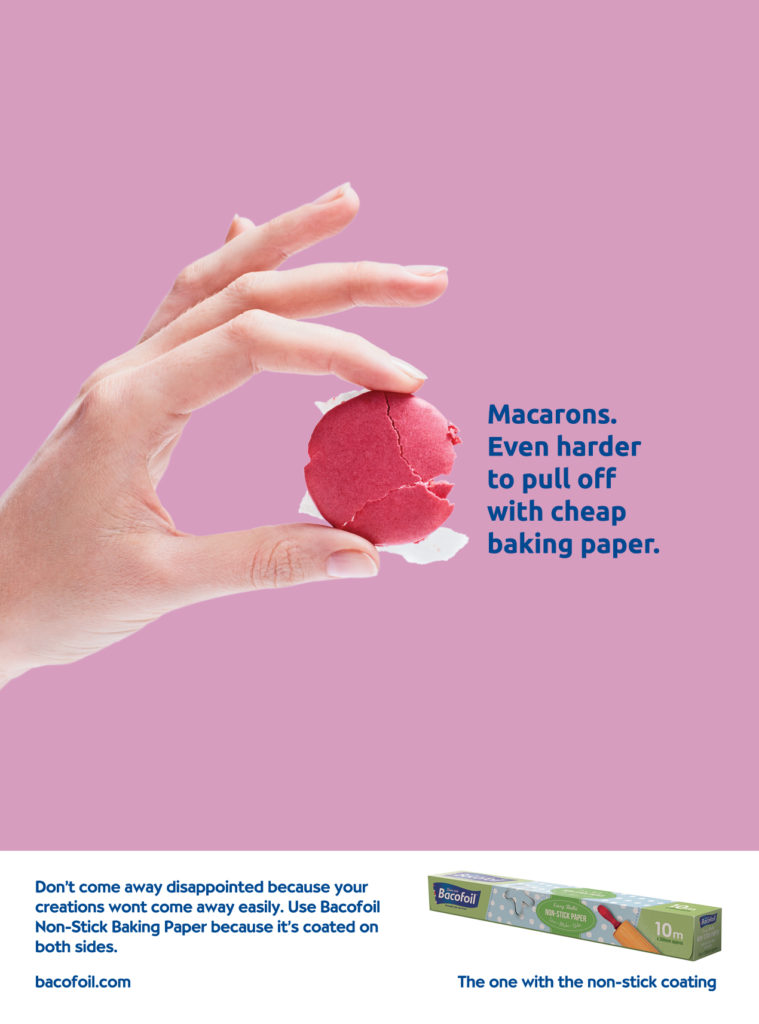For luvvas of linguistic levity
Apparently it’s the 50th anniversary of the invention of the all-time great slogan ‘Beanz Meanz Heinz’.
It’s a line I wish I’d written – but I would need to have done it at a prodigiously age. I did, however, pen a homage to it when working on Epson computers years ago. The TV campaign featuring the scientist Professor Heinz Wolff was shifting a tremendous amount of machines, so we ran a trade ad with the line: ‘Heinz Meanz Salez’.
I’ve nothing against breaking the odd spelling or grammar rule to create a memorable line, you’ll gather. Which is why I recently wrote these ads for Cuvva, a new insurance company offering ad hoc, short-term cover:
And in case you were wondering, that strange noise you can hear is my old English teacher whirling in his grave.
Posted on 16 October 2017
As easy as jedan, dva, tri…*
The accusation that Brits are lazy when it comes to learning other languages has always rankled with me, being a Modern Languages graduate. So when we went on holiday to Croatia recently, I thought I should make the effort to memorise a few basic phrases.
However, it proved to be a trickier task than I’d anticipated. While my knowledge of French and German is useful in understanding bits of Spanish, Italian and Dutch (because so many of the words are recognisable and guessable), it was of little or no use in learning Croatian words and phrases. And at my age, new words no longer stick as strongly as they once did.
I think I may also have bought too simple a phrase book. The section titled ‘Making Friends’ moved alarmingly quickly through the expressions for: ‘Nice to meet you’ – ‘Would you like to go out for a drink?’ – ‘Can I have your number?’ – ‘I love you’.
Some phrases were confusingly similar. For example, there’s not much difference between ‘U ponoć’ and ‘Upomoć’ – but while the former means ‘at midnight’, the latter means ‘Help!’ I suppose that context and intonation would usually make it clear which is intended; if you were to ask someone if they fancied getting together later, the desire or horror in their voice as they replied with one of these phrases would tell you where you stood.
There are also a few words which sound amusing to British ears. While our son thought it was quite funny that the word for ‘eight’ is pronounced ‘awesome’, he found it hilarious that the words for ‘hello’ and ‘goodbye’ are ‘bog’ and ‘Doviđenja’ (which he insisted on pronouncing ‘da vagina’).
Meanwhile, the term for ‘excuse me’ is ‘Oprostite’ – which I didn’t dare use at all. In the small supermarket in the town where we were staying, there was an occasion when I might have said it to get past a woman blocking the narrow aisle. But the fear that the woman might turn out to be British rather than a local, and that she might have thought I was calling her a sex worker, deterred me from doing so.
(* ‘one, two, three’ as if you hadn’t guessed)
Posted on 15 August 2017
Political slogans: not always strong and stable
Last year I wrote a couple of posts (see below) about the power of simple, often-repeated political slogans: in particular, Let’s Take Back Control (Vote Leave) and Make America Great Again (Donald Trump), both of which proved very successful whether you liked them or not.
It’s not surprising that the Conservatives tried to replicate this success in the campaign leading up to last Thursday’s General Election. They took a simple phrase – Strong and Stable Leadership – and repeated it ad nauseam, with a generous sprinkling of ‘Coalition of Chaos’ (a reprise of a catchphrase from the 2015 campaign) for good measure.
Though an obvious ploy, you can see why they thought this would work. And when Jeremy Corbyn briefly borrowed a trope from Trump himself (the claim that the system is ‘rigged’), the Conservatives may well have taken this as confirmation that they were on the right road.
But somewhere along the way, it went very wrong. Instead of being swept along by the phrase, people started to react against it.
The mocking poster on the right, created by artist Jeremy Deller, sprang up across London and helped to debunk the slogan. Not that much help was needed, since the incessant and stilted repetition by Theresa May was already causing her to be dubbed the ‘Maybot’. The ‘Strong and Stable’ line started to seem empty rather than compelling.
Perhaps sensing how the wind was changing, Labour swiftly dropped the ‘rigged’ line and concentrated on presenting Corbyn as someone who talks naturally and engages with people rather than endlessly repeating a line. There was a slogan – ‘For the many, not the few’ (actually proposed by adman Peter Souter last year) – but this wasn’t thrust down the public’s throat at every opportunity.
The result: the Tories lost their majority and Labour did far better in the vote than expected.
Could it be that the moment of the simple political slogan has passed? Has the antidote been found in the form of mockery? (It’s noticeable that President Macron of France took this approach after Donald Trump withdrew the US from the Paris climate agreement, vowing to ‘make the planet great again.)
Or is it that this General Election was a blip, and the slogan will regain its power in future campaigns?
Deciding which way to go will be a big, big call for the various party strategists.
Meanwhile, the standard of advertising in the campaign was pretty poor – at least, the ads I saw were poor. (I believe there was a lot of activity on social media, but since I keep away from that as much as possible I don’t know what ran there.)
What struck me was the lack of originality; there were a number of ads which bore a strong resemblance to ones from past campaigns. For example, this Lib Dem effort was more than a little reminiscent of an old Labour one:
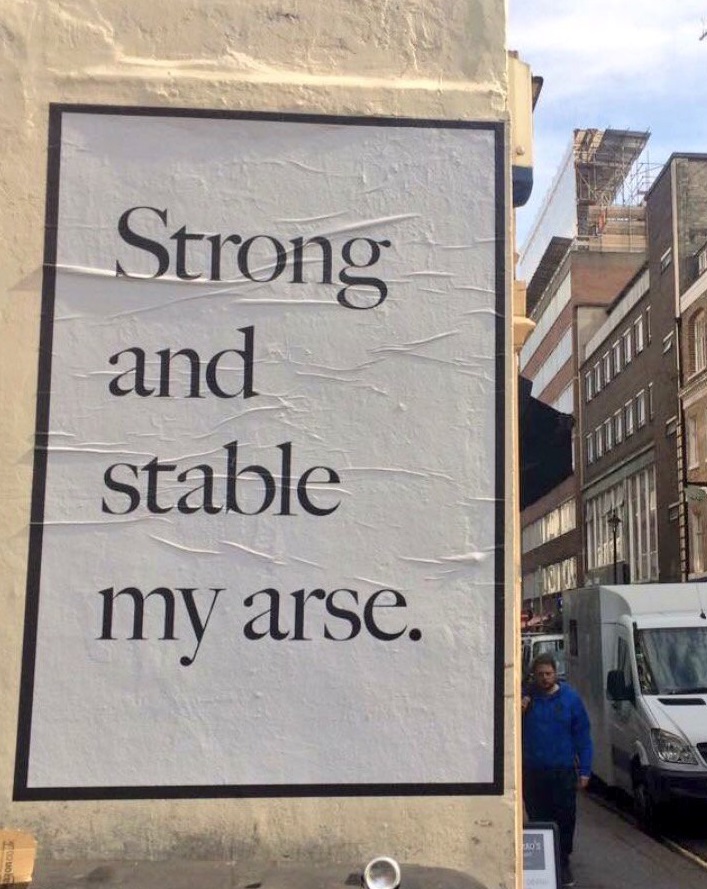
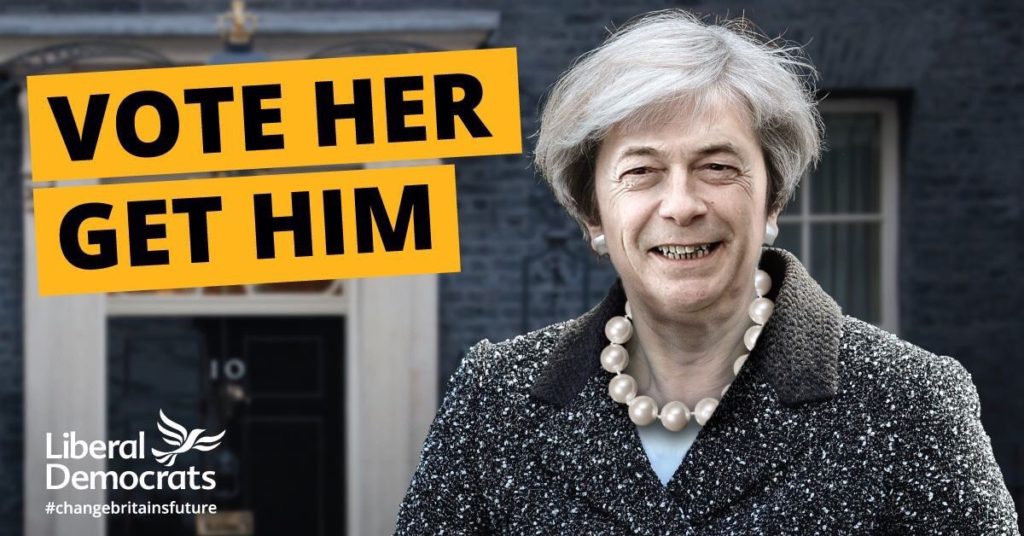
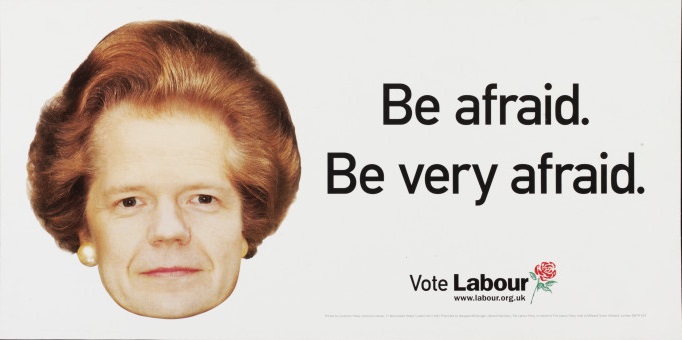
Labour produced an ad which looked like an old Tory one:
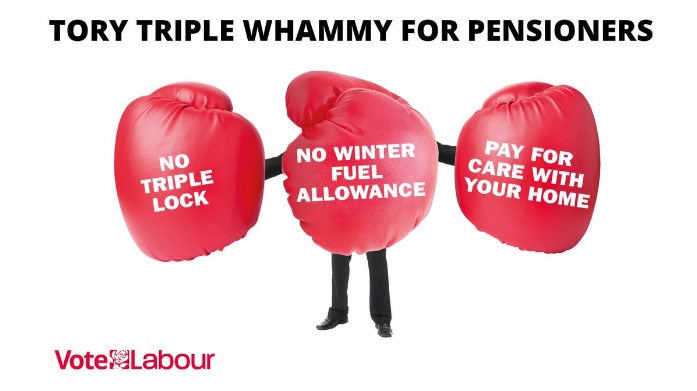
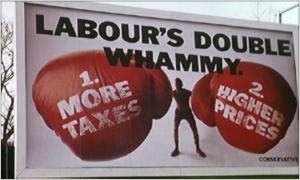
And the Tories reworked an ad from their own back catalogue:
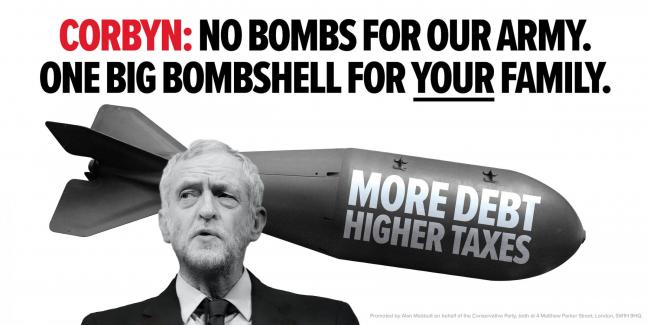
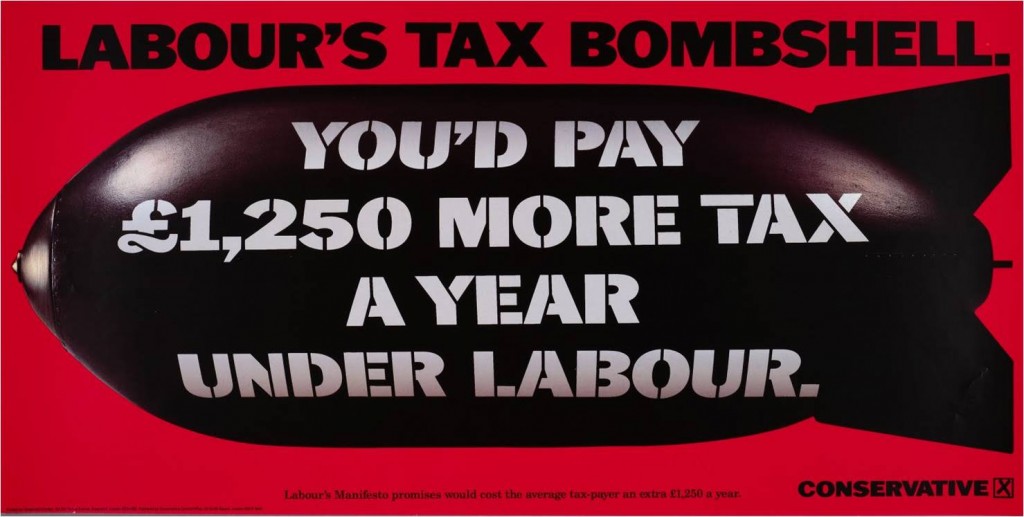
It’s something of an indictment of the ad industry that the most cutting and original poster of the election campaign was produced by someone who doesn’t work in the business.
Posted on 12 June 2017
Cheeky little b…
Our son Harry had one of the neighbours, a boy of similar age, round to play at our house the other day.
After Harry had said ‘Oh God’ a couple of times, his guest remarked that he isn’t allowed to use that expression at home since they’re quite a religious family. We had a word with Harry, suggesting that he should refrain from saying this in front of his playmate if it made him uncomfortable, and he duly agreed.
All went well for a while – but then a huge bee flew in through the window.
‘Jesus Christ, look at the size of that!’ Harry exclaimed.
Posted on 14 May 2017
The Apostle of Apostrophes
And I thought I was intolerant when it comes to poor grammar…
There was an item on BBC News this week about a man in Bristol who goes around under cover of night correcting misused apostrophes on signs.
Initially, I found this funny and wished I’d thought of doing it; after all, there are plenty of signs where I live which could do with being amended. (‘Ladie’s Hairdressing’, indeed…)
But even if the idea had occurred to me, I don’t think I’d have followed through with it.
Two reasons: first, I don’t have enough spare time to go creeping around shops which say they are open on Sunday’s or restaurants which are already taking party booking’s for Christmas; and second, I’ve recently noticed a slightly nasty side to the upholding of correct grammar.
You see it a lot in the ‘below the line’ comments of online news stories. Someone makes a point and commits a grammatical mistake in doing so, and immediately those of a different opinion mockingly seize on this as proof that their argument cannot hold water. There’s a sneering, aggressive, arrogant tone to their responses which isn’t pleasant at all.
As I mentioned at the start, I’ve always been a stickler for proper grammar and punctuation, and there have been plenty of times in the past when I haven’t been able to stop myself from correcting errors made by others. But now that I think about it, I generally did so when I was annoyed by them for some other reason; I used grammatical point-scoring as a way to belittle them when my real issue with them was something different. Not a fair or kind thing to do, and I now regret that I did it.
This makes me wonder how the owners of the businesses in Bristol feel when they see that their signs have been altered overnight. Pleased and grateful? Somehow I doubt it.
While I will carry on trying to maintain the highest standards in grammar in my own writing (and when proofreading), I’ll definitely think twice and thrice before pointing out errors in other situations.
Posted on 7 April 2017
Bloody hell, honestly…
It seems there’s a fuck of a lot to be said for swearing.
Back in 2011, this blog reported on an experiment which showed that swearing loudly can increase one’s resistance to pain.
And now a study indicates that profanity generally denotes greater honesty on the part of the speaker. A paper titled Frankly, We Do Give a Damn in the journal Social Psychological and Personality Science ‘found a consistent positive relationship between profanity and honesty; profanity was associated with less lying and deception at the individual level and with higher integrity at the society level’.
The thinking seems to be that just as they don’t filter their language to conform to the expectations of polite society, swearers are not filtering their views; we’re getting their honest opinions.
I can’t see any brands rushing to take advantage of this insight by using swear words in their advertising, though – even though leading B2B agency Velocity mooted the idea in this blog post a couple of years ago.
When Tourism Australia dipped their toe in the water with their ‘Where the bloody hell are you?’ campaign in 2006, it failed dismally and was eventually replaced by the more anodyne line ‘There’s nothing like Australia’.
While the outrage caused by that campaign was largely artificial, it does appear that we’re just not ready for sweary ads yet. And to be honest, I’m not too unhappy about that.
Advertising is essentially an uninvited guest in people’s lives – and if someone turns up in your home and starts effing and jeffing, you’re unlikely to be impressed by them.
There’s also a crucial difference between an individual swearing and swearing in brand communications; what may be an indication of raw honesty in the former is likely to come across as a cynical, attention-seeking ploy in the latter – so it’s likely that it would be counterproductive anyway. The only time I think it might be justified is in a hard-hitting charity ad – and even then, perhaps only in the form of a quote.
Sorry, Imodium, but the line ‘It works. No shit.’ is going to have to stay in the bottom drawer.
Posted on 20 January 2017
Do words matter in political campaigns? Like, bigly?
“Words matter, my friends. And if you are running to be President, or are President of the United States, words can have tremendous influence.” – Hillary Clinton, 10 August 2016
“Let me start by saying words matter. Words matter when you run for President, and they really matter when you are President.” – Hillary Clinton, 26 September 2016
“It’s just words, folks. It is just words.” – Donald Trump, 9 Oct 2016
The use of language is a major issue in the current US Presidential Election. Hillary Clinton has been forensic in the way she has taken Donald Trump to task for words he has used, particularly when describing women. She has detailed his use of the words ‘pigs’, ‘slobs’ and ‘dogs’, and highlighted the epithets ‘Miss Piggy’ and ‘Miss Housekeeping’ which he applied to the former Miss Universe Alicia Machado.
Meanwhile, commentators have had a field day analysing the rambling, incoherent and frequently ungrammatical nature of Trump’s language. Take a look at this example from an address he gave in South Carolina in July:
‘Look, having nuclear—my uncle was a great professor and scientist and engineer, Dr. John Trump at MIT; good genes, very good genes, OK, very smart, the Wharton School of Finance, very good, very smart—you know, if you’re a conservative Republican, if I were a liberal, if, like, OK, if I ran as a liberal Democrat, they would say I’m one of the smartest people anywhere in the world—it’s true!—but when you’re a conservative Republican they try—oh, do they do a number—that’s why I always start off: Went to Wharton, was a good student, went there, went there, did this, built a fortune—you know I have to give my like credentials all the time, because we’re a little disadvantaged—but you look at the nuclear deal, the thing that really bothers me—it would have been so easy, and it’s not as important as these lives are (nuclear is powerful; my uncle explained that to me many, many years ago, the power and that was 35 years ago; he would explain the power of what’s going to happen and he was right—who would have thought?), but when you look at what’s going on with the four prisoners—now it used to be three, now it’s four—but when it was three and even now, I would have said it’s all in the messenger; fellas, and it is fellas because, you know, they don’t, they haven’t figured that the women are smarter right now than the men, so, you know, it’s gonna take them about another 150 years—but the Persians are great negotiators, the Iranians are great negotiators, so, and they, they just killed, they just killed us.’
Sometimes Trump seems to be using words which don’t even exist. Such as ‘bigly’, as in ‘We’re gonna win bigly’.
(It has been suggested that he is actually saying ‘big league’, though that’s hardly any better, grammatically speaking.)
Trump, meanwhile, is unconcerned about any of this. He seems to see words as nothing but air; intangible objects which dissipate as soon as they’ve been uttered and are no longer important from that point on.
By any logical standards, one might think that the issue of language alone would give Hillary Clinton an unassailable advantage. How could any right-thinking person vote for someone who uses such appalling terms to describe women, and who appears unable to put a coherent sentence together?
But this US election doesn’t appear to be following the usual rules or accepted logic, and there are a number of reasons why Clinton and her supporters should be concerned.
First, Clinton has dropped a linguistic clanger of her own, declaring on 9 September that half of Trump’s supporters belong in ‘a basket of deplorables’. Even though she went on to define these people as those who are ‘racist, sexist, homophobic, xenophobic, Islamophobic – you name it’, she later had to apologise, or at least express regret, for her sweeping generalisation and the term used.
Second, Trump’s supporters are not put off by the language he uses; they actually like it. As Nerdwriter (the commentator in the video on the right) points out, Trump’s speech is at a fourth-grade reading level – i.e. the level of children who are 9-10 years old – while Clinton’s language is considerably more sophisticated. Trump’s words are easier to understand – and there may even be more to it than that.
To quote Nerdwriter: ‘If you are an American citizen who for years has listened to politicians sound sophisticated while accomplishing nothing, you might just be primed for something that is everything they are not’.
Voting for someone who doesn’t talk coherently precisely because people who do talk coherently have been a let-down in the past – that’s hardly a logical course of action. But then, as said, this election isn’t following the usual logic.
Thirdly – and perhaps most importantly – there is an area of language where Trump is winning.
That is, in the use of a campaign slogan which his supporters repeat like a mantra and wield like a banner: Make America Great Again.
As we saw in the Brexit referendum campaign, such a slogan can galvanise support and become a rallying-cry; while ‘Let’s Take Back Control’ may not have been the primary driver of the Leave camp’s victory, it certainly helped them. No matter that it was nebulous and (arguably) didn’t stand up to scrutiny; Leavers could ascribe their own meaning to it to bolster their opinion. And the Remain campaign didn’t manage to come up with anything to rival its effectiveness, the rather insipid ‘Stronger In’ failing to inspire even its strongest supporters.
‘Make America Great Again’ is as vague and vacuous a slogan as ‘Let’s Take Back Control’ – but despite this, and its echoes of a phrase coined by Mussolini, it does seem to be as capable of striking a chord among the disaffected. And as with the Brexit slogan, there isn’t a line of equal power coming from the opposite side.
To date, the Clinton camp has tried ‘Love Trumps Hate’ and ‘Stronger Together’ (which seems to be a hybrid of ‘Stronger In’ and the line used in the Scottish independence referendum campaign, ‘Better Together’) – but while these are clever and sound respectively, neither has established itself as strongly as the Trump lines, or for that matter the ‘Yes We Can’ line which helped carry Obama to the presidency.
For someone whose profession involves trying to influence people through words, the whole situation is rather confusing. On the one hand we have the power of the slogan – just a few words that can apparently sway a nation. Yet on the other we have ill-chosen words which don’t seem to have as negative or significant an influence on public opinion as we might think.
But perhaps it has always been this way in advertising too. There are slogans which are so powerful, they can build huge brands. (A case in point being Specsavers, who are so aware of the power and value of their endline that they are trying to trademark the word ‘should’ve’.)
Yet at the same time, millions of other words in ads simply float off on the breeze with no effect and no consequences. (For example, no one else seems to be bothered by how dreadful the new strapline for Stella Artois – ‘Be Legacy’ – is. At least, I haven’t noticed any reaction.)
Given this unpredictability and illogicality, I suppose all a copywriter can do is keep striving to put together words which will achieve that elusive major impact – and to make sure they are comfortable with what’s written and with whatever might result from that.
It would, after all, be shameful to write words likely to sway a large section of the public – a bus side promising loads of cash to the NHS, say – knowing that no one will be held to account when these words turn out to be misleading.
Posted on 18 October 2016
Traditional skills
A few well-chosen words. An image.
The two elements playing off each other to create a simple, easy-to-understand message.
No attempt to engage the audience in any sort of interaction, inviting them to ‘join a conversation’ or ‘make the campaign their own’ through user-created content.
Simply telling them, on a page, the benefits of a product. Why it’s good and how it will help them.
It’s rare these days (for me, at least) to have the opportunity to write some simple, straightforward print ads without having to spin the whole thing out into a 360o multi-channel experience with all the experiential, interactive and activation elements this usually involves.
But the chance recently presented itself when I got to write these ads for Bacofoil baking paper.
They look rather old-school, it’s true. But being old-school myself, I like that.
Click on the images to see larger versions.
Posted on 15 August 2016
72 baps
Unless you’re tasteless enough to take part in one of those celebrity death sweepstakes (and no, I’m not going to link to any of them), 2016 has already been a terrible year for the passing of eminent people – and specifically, creative people who were truly innovative and influential.
But with the greatest respect to David Bowie, Prince, Garry Shandling and Zaha Hadid, the death which has shocked and affected me the most has been that of Victoria Wood.
Not just because I always loved her work – I remember paying £24.99 for a VHS video of As Seen on TV back in the 1980s, and a cheapskate like me would never have forked out such a sum if it weren’t brilliant – but because it’s another metaphorical nail in the coffin for a particular style of TV comedy. That is, comedy which uses rich, beautifully-crafted, tone-perfect, memorable language.
With the stress on ‘memorable’. You can’t help but notice in all the tributes to her that people can’t help quoting lines from her work. Some are short and simple (“Is it on the trolley?” “One soup… and… another soup”), but some lines stay with you because of the joy and skill evident in the choice of words. For example:
“And where has it got you, having a pelvic floor like a bulldog clip?”
“Some of us drink champagne in the fast lane, and some of us eat our sandwiches by the loose chippings on the A597.”
“He’s not really my husband, but he did rub up against me in a sports coat once so he’s as good as.”
“I’ve just had my TV mended. I say mended – a shifty young man in plimsolls waggled my aerial and wolfed my Gipsy Creams, but that’s the comprehensive system for you.”
“In India when a man dies the widow flings herself onto the funeral pyre; in England she just drags herself to the kitchen and says ‘72 baps, Connie – you slice, I’ll spread’.”
“It’d take two big lads and a wheelbarrow to get her buttocks clenched.”
And of course every line from this:
As well as the glorious choice of words, it’s the strong Northern tone that makes Victoria Wood’s writing so powerful for me. Not because I’m Northern; coming from Norwich, I’m… er… Eastern, I suppose. It’s because I’m often moved by work which is very specific to a place but at the same time is universal. The music of Sigur Ros from Iceland, for instance. Seinfeld, set in New York. The film Cinema Paradiso, about a particular village in Italy but which speaks to anyone who has strong feelings for home.
Perhaps the comedic wordcraft is a particular Northern trait. I’m thinking here of Alan Bennett, and of the work of Les Dawson, who would wax lyrical from time to time:
“In awe, I watched the waxing moon ride across the zenith of the heavens like an amber chariot towards the ebony void of infinite space wherein the tethered belts of Jupiter and Mars hang, for ever festooned in their orbital majesty. And as I looked at all this I thought… I must put a roof on this toilet.”
Is there any current TV comedy which delights in and displays glorious wit and skilful wordplay? I don’t watch as much TV as I once did, but I’m not aware of any. It’s a thought which I’ve mulled over a fair amount lately, since I’ve fallen into the habit of watching reruns of the sublime Frasier in recent weeks.
Why are there no comedies on screen these days which have dialogue of the quality of the following exchanges, taken from just the first ten minutes of the episode (scripted by the brilliant Joe Keenan) that was on air this morning?
Niles: Guess who just won this year’s Marriott-Fassbinder award for distinguished contribution to the literature of psychology?
Frasier: Judging from the canary feathers protruding from your mouth, I’d say you. What article did you win for?
Niles: A gripping case history of a narcissistic opera singer. I called it ‘Me Me Me Me Me’.
* * * * *
Daphne (to Sherry): I keep meaning to ask, what’s that lovely perfume you’re wearing?
Sherry: It’s called ‘The Lady’s Boudoir’. You wouldn’t believe what a bargain it is – for a hundred bucks I could buy enough to drown myself in.
Niles (aside, to Frasier): I’ve got sixty…
Is it because there are no writers around who are capable of this? Possibly. Despite her self-deprecating claim that “if anyone spent as long as I do working on scripts, they’d be bound to come out good”, it’s clear that writers as talented as Victoria Wood are rare indeed.
But I wonder whether it’s also down to the tastes of those who currently commission comedy for the box. It’s apparently a prerequisite for new sitcoms to be ‘dark’ and ‘edgy’, while dialogue with clever turns of phrase seems to be rejected as unnaturalistic and old-fashioned.
As a lover of old-fashioned comedy, I dearly hope that something in this vein can break through again. But I fear that we may never see the like of Victoria Wood again.
Posted on 25 April 2016
The dreaded letter
There’s a story, probably apocryphal, about two professional footballers discussing the passing of a mutual acquaintance:
Player 1: Did you hear that X has died?
Player 2: No! Really? What did he die of?
Player 1: The big C got him.
(Pause)
Player 2: He drowned?
Perhaps not the most appropriate introduction to a new film for World Child Cancer to which I’ve contributed, but there you go…
Posted on 15 March 2016





